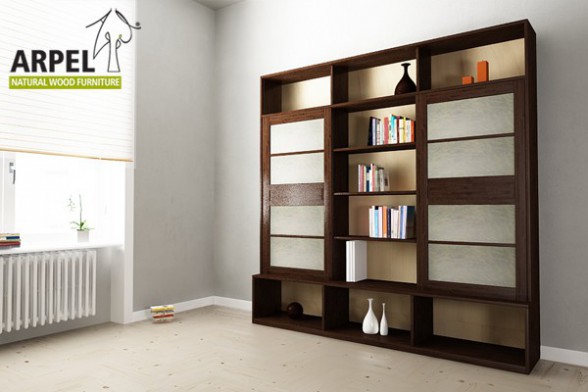No products
Variant Plus Bookshelf 2 Sliding Doors
New product
The Variant Plus Bookshelf 2 Sliding Doors made of solid beech wood with two rice paper sliding doors is very elegant and versatile. It has two sections closed with sliding doors and an open section with shelves. A particular touch that adds character to this minimal design is the horizontal wooden insert that runs along the centre of the Shoji doors.
Product Options
Couldn't find the dimensions you need?
Ask for a custom made productMore info
Product features
The Variant Plus Bookshelf with 2 Sliding Doors offers a modern, minimalist interpretation of the traditional Japanese style.
This bookshelf is made of natural, solid lamellar beech wood and has 15 height-adjustable shelves with plenty of space for all kinds of objects and utensils: 7 shelves are in the open part and 8 are behind the sliding doors.
The lower section of the bookshelf protrudes for 10 cm over the rest of the frame and the base of the bookshelf is equipped with a small pedestal with leveling feet to make it extra stable.
If you prefer this bookshelf without a protruding lower section, check out our Variant Basic Bookshelf with 2 sliding doors. In this model all shelves have the same depth.
The entire back of the bookshelf is covered with a rear panel.
For a custom number of shelves, ask for a price quote.
Dimensions
Width x height: from 200 x 200 cm to 250 x 250 cm
Depth: from 30 to 50 cm Should you wish other dimensions, ask for a price quote.
Types of wood and panel thickness
Exterior and shelves: solid 19 or 26 mm thick lamellar beech wood
Sliding door: solid 19 mm thick lamellar beech wood
Sliding doors
We offer three different sliding systems for the Shoji doors:
1. the traditional Japanese wood-on-wood system with sliding doors on wooden rails
2. sliding doors with integrated wheels which glide on wooden rails
3. a modern sliding system on metal fixed to the base and doors on height-adjustable wheels
For more information about our sliding systems visit our Japanese sliding doors page.
Regarding the door handles, we offer different solutions starting form the plain version without handles. You can also choose sliding doors with simple groove handles or Quadro model handles with a colored panel.
Door covering
For the Shoji doors rice paper covering we offer different options:
1. Plasticized rice paper. This means that the rice paper is covered with a layer of plastic (PVC) on each side. This type of covering is semi-washable and can be cleaned with a damp cloth and water.
2. White fiber rice paper glued to a polycarbonate panel and then vitrified. For this type of covering the rice paper is first moistened and glued onto a 1mm thick supporting layer of transparent polycarbonate, then it is uniformly sprayed with a water-based vitrifying liquid for further protection. This technique increases the stability while maintaining the natural, slightly creased consistency of the rice paper. With this type of treatment, the Shoji doors become perfectly resistant to shock and pressure, which can occur due to a frequent opening and closing of the wardrobe.
3. Plasticized rice paper reinforced with a polycarbonate panel. A transparent plastic panel will be put behind the rice paper, glueing is not necessary. For more information about our rice papers and their treatments, visit the rice paper page.
If you wish, the doors can also be covered with whitened beech panels or fabric. Please ask for an estimate of cost if you are interested in this option.
Wood finish
The Variant Plus Bookshelf with 2 Sliding Doors is available in natural untreated wood or wood treated with a water-based ecologic finish in different colours. If you prefer a transparent finish that serves just to protect the wood and make it smoother to the touch, without coloring it, choose the option „oiled“.
For more information about our finish treatments check out our wood finishings page.
Assembly
You will need a crosshead screwdriver for the exterior and interior of the bookshelf body and a drill for the rear panel. If you prefer to hire a fitter in your city, you can use this contact form
Care and maintenance
When cleaning treated wood use a damp sponge without solvents or cleaning agents. Untreated wood may instead be vacuumed or dusted. The rice paper covering may be vacuumed or wiped with a damp sponge.






